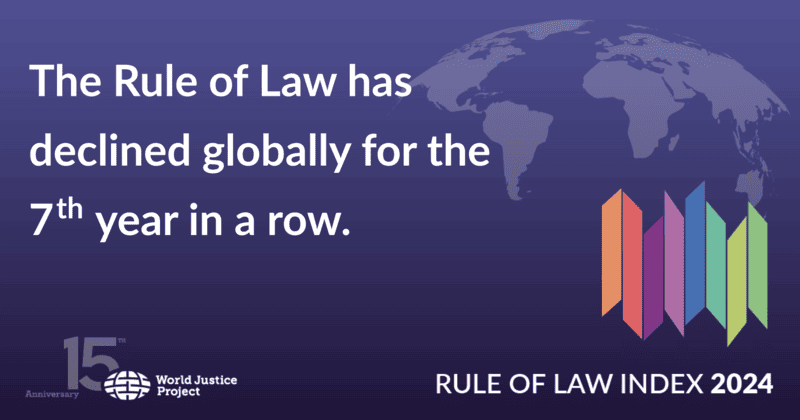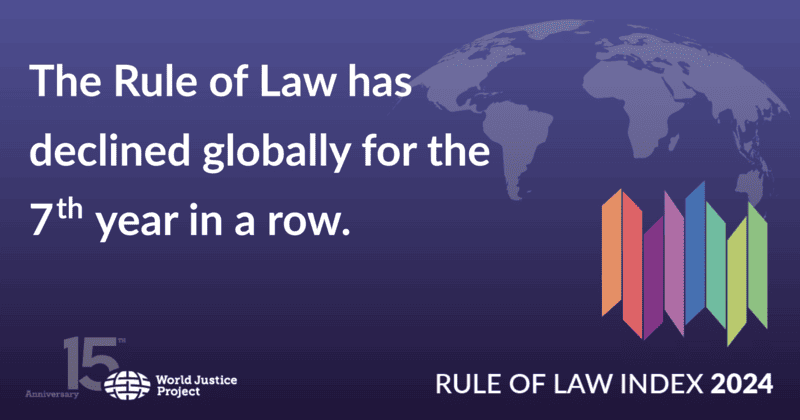Rule of Law Continues to Decline: World Justice Project

Rule of Law Continues to Decline: World Justice Project
The WJP analysis reveals that authoritarian trends have continued to set countries back on protecting human rights and democracy.
For the seventh year in a row, the rule of law has declined globally, according to the World Justice Project (WJP) Rule of Law Index 2024, released on October 23.
This year, according to WJP, the rule of law again weakened in a majority of countries surveyed (57%). However, Index data also suggests the global rule of law recession is slowing and that progress is possible.
The proportion of countries where the rule of law is eroding has shrunk for the third year in a row, and some notable areas of improvement have emerged. For the first time in five years, more countries improved than declined on the Index factor measuring Absence of Corruption. This year, corruption declined in nearly three-fifths (59%) of countries.
A majority of countries also improved on ensuring effective criminal justice. Overall, civil justice declines have slowed considerably since the height of the global pandemic, though problems delivering timely and independent civil justice have continued to spread.
Meanwhile, the WJP analysis reveals that authoritarian trends have continued to set countries back on protecting human rights and democracy.
“After seven consecutive years of rule of law declines it can be easy to focus on the negative. But to do so would ignore accomplishments in anti-corruption and the hard work occurring to improve justice systems globally,” WJP Co-founder and President William H. Neukom said. “The global community must redouble efforts to expand these rule of law gains in all areas.”
Last year, there was some hope that global authoritarian trends had begun to slow. This year’s Index, however, finds broader and deeper declines in two critical Index factors: Fundamental Rights and Constraints on Government Powers.
[ Also Read: India Judicial Research Report 2024. Decline of the Indian Judiciary ]
The long-term implications are troubling. Between 2016 and 2024, people in 81% of countries have lost protections for their fundamental rights. Additionally, 77% of countries show a weakening in governmental checks and balances, including oversight by legislatures, courts, civil society, and the media.
Over 6 billion people now live in countries where rule of law is weaker than it was in 2016. “In every corner of the world, we continue to see leaders consolidating their authority,” Neukom added. “This has grave implications for individual freedoms, government accountability, and people’s ability to choose their leaders through free and fair elections.”
Since the global rule of law recession began in 2016, the Index subfactor measuring lawful transition of power has declined in 72% of countries. In this global year of the election, this principle is being put to the test.
In 2024 elections so far, the ruling party has maintained power in 13 out of 15 countries with below average scores on this subfactor. Meanwhile, some of the most improved countries in the 2024 Index saw new, democratically elected governments take office last year.
Voters in Brazil and Poland opted for change in each country’s most recent national elections. Both countries had experienced some of the largest rule of law declines since 2016 before changing course in the past year.
The WJP Rule of Law Index is stated to be the world’s leading source of original, independent rule of law data. Its rigorous methodology draws on expert and household surveys to measure rule of law in 142 countries and jurisdictions, covering 95% of the world’s population.
Each country’s score is an average of eight factors: Constraints on Government Powers, Absence of Corruption, Open Government, Fundamental Rights, Order and Security, Regulatory Enforcement, Civil Justice, and Criminal Justice.
The top-ranked country in the 2024 WJP Rule of Law Index is Denmark, followed by Norway (2), Finland (3), Sweden (4), and Germany (5). The top five ranked countries remain unchanged from 2023. The bottom ranked countries are Venezuela (142), Cambodia (141), Afghanistan (140), Haiti (139), and Myanmar (138).
The countries with the biggest rule of law declines in the past year are Myanmar, El Salvador, and Nicaragua, while the countries that improved their rule of law score most from 2023 to 2024 are Poland, Vietnam, and Sri Lanka.
Courtesy: World Justice Project





